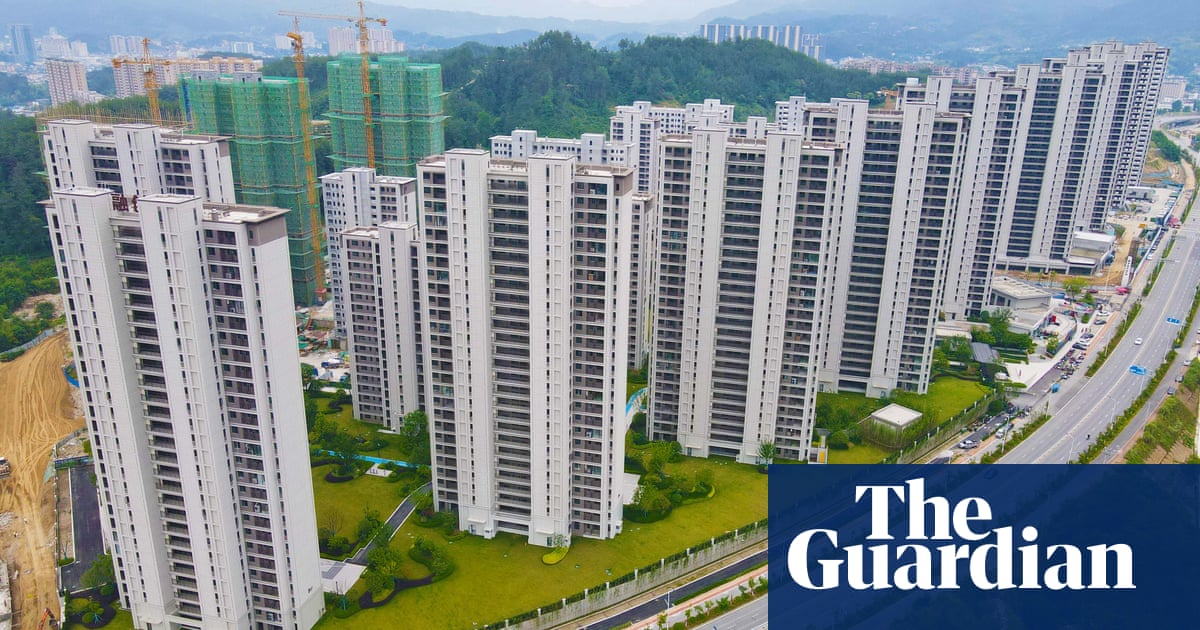- cross-posted to:
- worldnewsnonus@lemy.lol
- cross-posted to:
- worldnewsnonus@lemy.lol
The industry that has traditionally powered about a quarter of GDP has been in a downward spiral that policymakers have struggled to halt
All across China, from Beijing in the north, to Shenzhen in the south, millions of newly built homes stand empty and unwanted. There were nearly 391m sq metres of unsold residential property in China as of April, according to the National Bureau of Statistics. That is the equivalent of Manchester and Birmingham combined – and then some – sitting as vacant, unwanted property.
This glut of idle property has caused a headache for the government, shaken the world’s second largest economy and raised tensions over the purpose of housebuilding in a nation where property investment had been viewed as a safe bet.
Since the real estate sector was sent into a tailspin in 2020, caused by the pandemic and a sudden regulatory crackdown, the industry that has traditionally powered about one-quarter of GDP has been in a downward spiral that policymakers have struggled to halt.
The crux of the problem is that, with shaky faith in the economy and big property developers failing to deliver on paid-for apartments, potential homebuyers are keeping their money out of the market.
They are unwanted for the price that is wanted but for free I bet they could fill them up in a jiffy but that would make them dirty filthy communists and china don’t want that ??? /s
Ehhh, you would think that. However, China currently has more housing than people. I think at the moment the excess housing in the country could home an extra 150m people.
You can knock them for ignoring basic fundamental economic ideas like supply and demand, but it’s not like they have a large homeless population being unsheltered.
Does china house them or does china do something else with them?
Yes.
Well they could use them as makeshift landfills for their garbage EVs, but people cannot live in them as there is no water, gas or electicity anywhere. And that’s only half the problem because there are far more empty shells for an excuse of a home than there are people to populate them. It’s one giant ponzi scheme that got completely out of hand over a decade ago and the government struggles a lot to restrain and keep it going at the same time so it doesn’t collapse.
yeah it is funny that an article talking about empty, unwanted units also talks about not delivering for poeple that bought them. Its a wierd situation.
What China needs to do is figure out a way to export this property to America, which needs more affordable homes.
That’s doable, right?
I live in China. Trust me, you don’t want to have those homes in the US. The house I live in has been completed in 2016 and I’m the first tenant, moved in in 2018, and it’s got more issues than my dad’s house from 1965. Houses here are built as cheaply as possible, skimping on building materials, safety, plumbing, insulation, wiring, etc.
The pricing bubble is just a joke on top. The actual value of the real estate here should be about 20-25% of what it is in reality - for example if I were to buy the house I’m renting right now, I’d break even after 114 years. Not taking any repairs or interest into account.
Sadly, that’s not much different than the US
We’re talking about high rise buildings with cardboard mixed into the concrete that collapse within less than 5 years in many many cases. They often don’t have plumbing or electricity as they are only constructed to get people to invest in property, not to live in them. US citizens really don’t know how much regulations and their enforcement are doing for them.
Nah, the situation is way different in the US. The construction quality is way way better due to building codes and actual enforcement of that. Though some construction does fall through the cracks, it’s a good bet that the vast majority of construction here is safe. There is a pricing bubble here, but that’s for different reasons. And renting here is nowhere near as cheap as this person says. They said it would take 114 years to pay back the cost of a house compared to renting. In the US, rent is usually slightly more or even much more than a mortgage and goes up over time, so your worst case scenario is less than 30 years.
Yes. One reason why new housing in the US is expensive is because there are way more regulations now than there were years ago. Houses now are much safer and built better. But that makes them more expensive.
Tell me about it. I’m in the middle of construction right now, and the various hoops I’ve had to jump through and mazes of codes I’ve had to navigate are insane. And it all makes things so much more expensive. And the number of inspections and permit plan check meetings I’ve had to do has taken so much of my time.
I probably shouldn’t have tried to GC this myself.
Remember that all of those regulations are for a reason. Sometimes the reason is "contractors donated money to an elected official, but it’s usually a good result. It’s better to have higher quality than lower.
G’Day from the land down under of dogshit-quality housing-bubble-overpriced new builds. God I love how much money corporations are making.
Seriously, that describes what I’ve seen in the housing market these days to a T
Removed by mod
The construction quality is… shall we say, not great. Pretty sure lots of it would not pass code in the states - let alone Europe, Korea, or Japan.
That’s okay, I don’t think we have teleportation technology yet anyway.
That shouldn’t be a problem, most landlord owned properties don’t pass code here either
at the time it was built?
Hm. That didn’t work out too well. Maybe they could switch over their economy to be based on tulip bulbs? That’s bound to work forever.
Can’t they just give the homes to people to fulfill their Communist agenda?
In a communist state, why are unsold homes an issue? Why not just re home the millions living in bad conditions?
it’s because China is a capitalist country with a capitalist economy.
This is the best summary I could come up with:
Since the real estate sector was sent into a tailspin in 2020, caused by the pandemic and a sudden regulatory crackdown, the industry that has traditionally powered about one-quarter of GDP has been in a downward spiral that policymakers have struggled to halt.
The crux of the problem is that, with shaky faith in the economy and big property developers failing to deliver on paid-for apartments, potential homebuyers are keeping their money out of the market.
Tao Ling, an official with the PBOC, said that local state-owned enterprises would be encouraged to use the funds to buy “reasonably priced” homes and turn them into affordable accommodation.
“While these local players are desperate to prove they can continue to deliver growth, they will be struggling with other priorities and unwilling to add to their debt obligations for investments that won’t provide any long-term profits.”
The authorities “know there isn’t really market demand” for the acres of unsold property, says Alicia García-Herrero, the chief economist for Asia Pacific at Natixis, an investment bank.
García-Herrero expects that there will be more fiscal reform to boost the impact of the policy, likely at the long delayed meeting of the Chinese Communist party’s central committee in July.
The original article contains 958 words, the summary contains 202 words. Saved 79%. I’m a bot and I’m open source!







